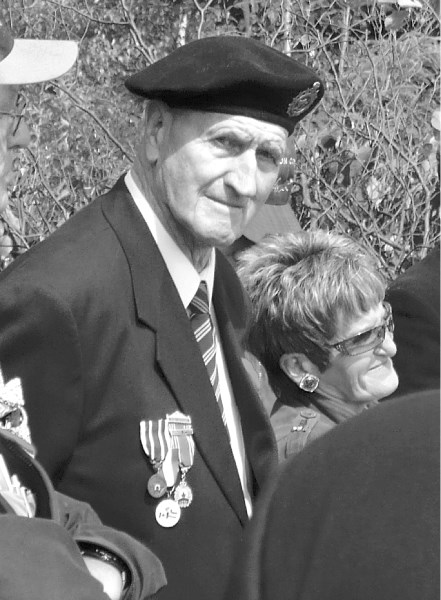Every year on Remembrance Day, there are fewer and fewer World War II veterans alive to tell their story. The Post was fortunate to have 87-year-old Caslan resident Glen Meyer share his story with us.
Meyer was 18 when he joined the military in 1943. He completed basic training in Camrose, and then traveled to Camp Borden in Ontario and was part of the Amber Core of the army.
“We were sent overseas to England, and shortly thereafter we were shipped to Italy,” said Meyer. “I was placed with the Ontario Tank Regiment as a Gunner Operator just before the Battle of Cassino.” That battle was a series of four attacks as the Allies tried to break German lines and seize Rome.
Meyer also spent time in Holland, Marseille, and Belgium. He said he spent time with the Polish, American and Indian Armies. Because he was part of the 1st Armored Tank Brigade, he said he was often sent to many different places. He vividly recalls one assignment where he saw children along the way and asked them what they thought of the Germans, and their reply was that the Germans had stolen their bicycles.
“So in March or April when we were coming to the last bridge, the Nijmegan Bridge, to cross the Rhine, I couldn’t believe it when we found the 2nd Canadian Armoured Tank Brigade, which had all been blown up – and there were piles and piles of bicycles nearby. I remember saying ‘we’ve found the bicycles.’”
Meyer was 21 when the war ended, and he received five medals for service, which he said everyone received for going to war overseas. He settled in Caslan, where his father had homesteaded since 1932. He’s been there ever since. He said he’s glad he went to war because it was an experience, but he wouldn’t tell anyone to go.
“It was different then. We knew who we were fighting. I remember going on a veteran’s tour to Italy in 1988, and we toured some military cemeteries. Most of the ages of those buried were, on average, 23 or 24 years old. It was incredible.”
“At that time, you volunteered for the army or you were conscripted,” said Meyer, adding that his choice was also a family affair. “My brother Walter – he was six years older – was also there on D-Day. He was a Battery Truck Driver. He met my sister-in-law, who was in the British Air-Force, and they were married in Scotland when the war ended.”
Meyer said Remembrance Day has become more important to him with each passing year.
“Now it’s begun to mean more to me than it did before. It’s more than just a holiday.”


